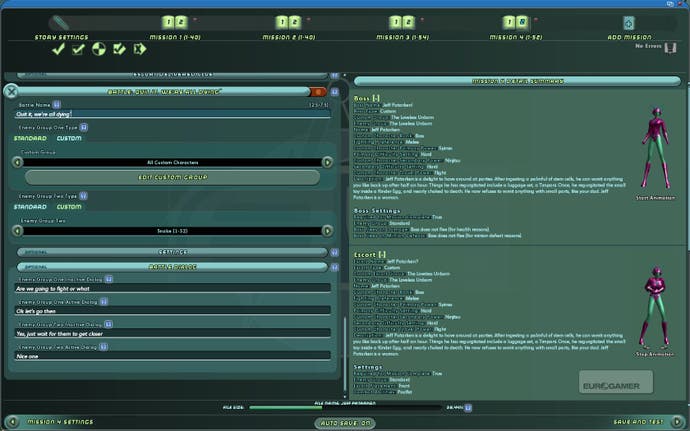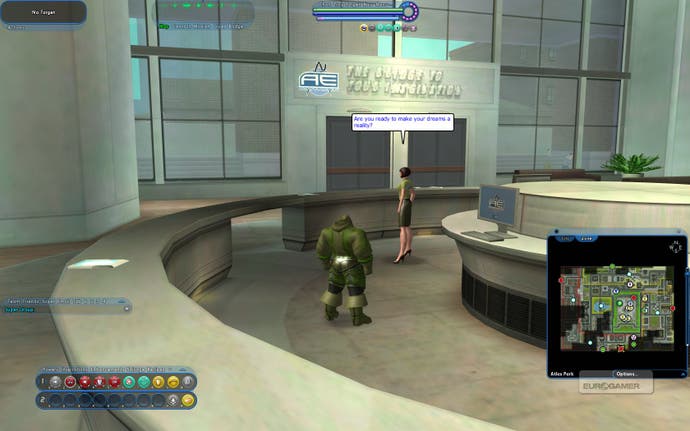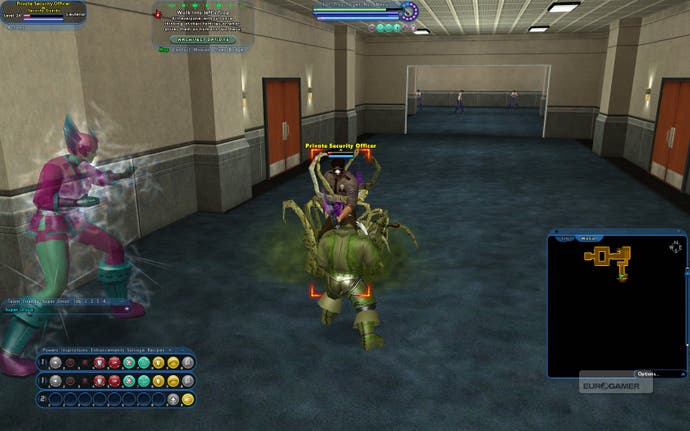City of Heroes: Mission Architect
Popping the quest in.
As you may be aware, the Issue 14 update to City of Heroes included the Mission Architect, which opened the game to player-created missions.
In almost any other MMO, it would be a disastrous idea. You'd be opening up your precious lore to savage abuse by the idiot public. But comic books are resilient enough to take a bit of a battering. And if there's any set of comic book characters that's used to dealing with baffling and contradictory canon, it's superheroes. After all, DC had to create and destroy an infinite number of Earths before it could even work out what was going on in its own universe. Paragon City can probably deal with a few idiots like me writing stories about some bloke getting upset in a supermarket.
Mission Architect responds to a suspicion that's flickered through every MMO player's mind. After being asked to perform so many similar missions, to kill so many creatures of a certain type, to escort so many helpless villagers and search so many chests, you begin to wonder if the endless world of imagination that you signed up to when you handed over your credit card details... you begin to wonder it isn't just a bunch of templates.
It's a dumb realisation. Of course it's templates. Rip off the UI, and MMOs are a database no more glamorous than the TV Licensing register. And when you're dealing with such huge amounts of content, it's slightly bizarre to expect the programmers not to have reusable models and frameworks. They're programmers - that's what they do.

What the Mission Architect does is expose those templates. It transposes every text field into a form, lets you choose the success conditions of the missions, and allows you to populate your levels with the game's pre-set gangs, or characters you've designed yourself. It does this in a way that might destroy the magical illusion for anyone who hasn't really thought about it. But it also does it in an elegant, sophisticated and intuitive way that makes setting up your own missions close to effortless.
Architect Entertainment buildings have appeared in towns - and it's here that you'll play other people's stories, and write your own. It's initially disappointing that your missions don't appear in the real world, but restricting them to these buildings creates a welcome division between the official canon and the fan-built lunacy. Let's make a mission.
I'm going to try and do this without reading a manual. Reasoning that the Mission Architect is aimed at the general public, and reasoning further that the general public read books called "Shopaholic Ties The Knot", I reckon I should be able to work out what's going on here.

Happily, I'm right. The interface is friendly, and everything either makes immediate sense, or has a pop-up that explains exactly what it means. So, I set up the basic story settings. What's the mission called? Who's the mission giver? Is it open to Heroes, Villains, or both? This is the shortest section of the process, and I'm keen to get into the deeper bits, so I choose a pre-defined character, call him Gareth, and move onto a basic mission.
Basic Objectives
There are eleven objectives that you can add to a map, and each one can either be essential to the successful completion of a mission, or a side-bonus. I start off with a basic objective, "kill everyone on the map". This spawns a list of options, allowing me to select one of the pre-set groups of NPCs - if you fancy keeping your story in the Paragon City canon - or creating your own groups and members.

Choosing a group with a tight level range will restrict access to your mission, so you'll have to be consistent. This is a shame: having your creativity stifled by arbitrary numbers when their powers could be scaled back or boosted to match the player level seems unnecessarily tight. But, if you're going to use Cryptic and Paragon's canon, I guess it makes some sense to stick within their level ranges. You just can't have a story arc that involves ghost pirates and tentacles, that's all.
Keeping my missions accessible to everyone, I'm limited - so I fill an office block with security guards and ask the player to kill them all. Keeping the interface clean and text-based, you don't place the guards yourself, selecting instead how an algorithm will distribute them across the level.
Without a specified reason for the attack, this is just the sort of amoral, needless murder of family men just doing their jobs that makes me glad to be alive.








